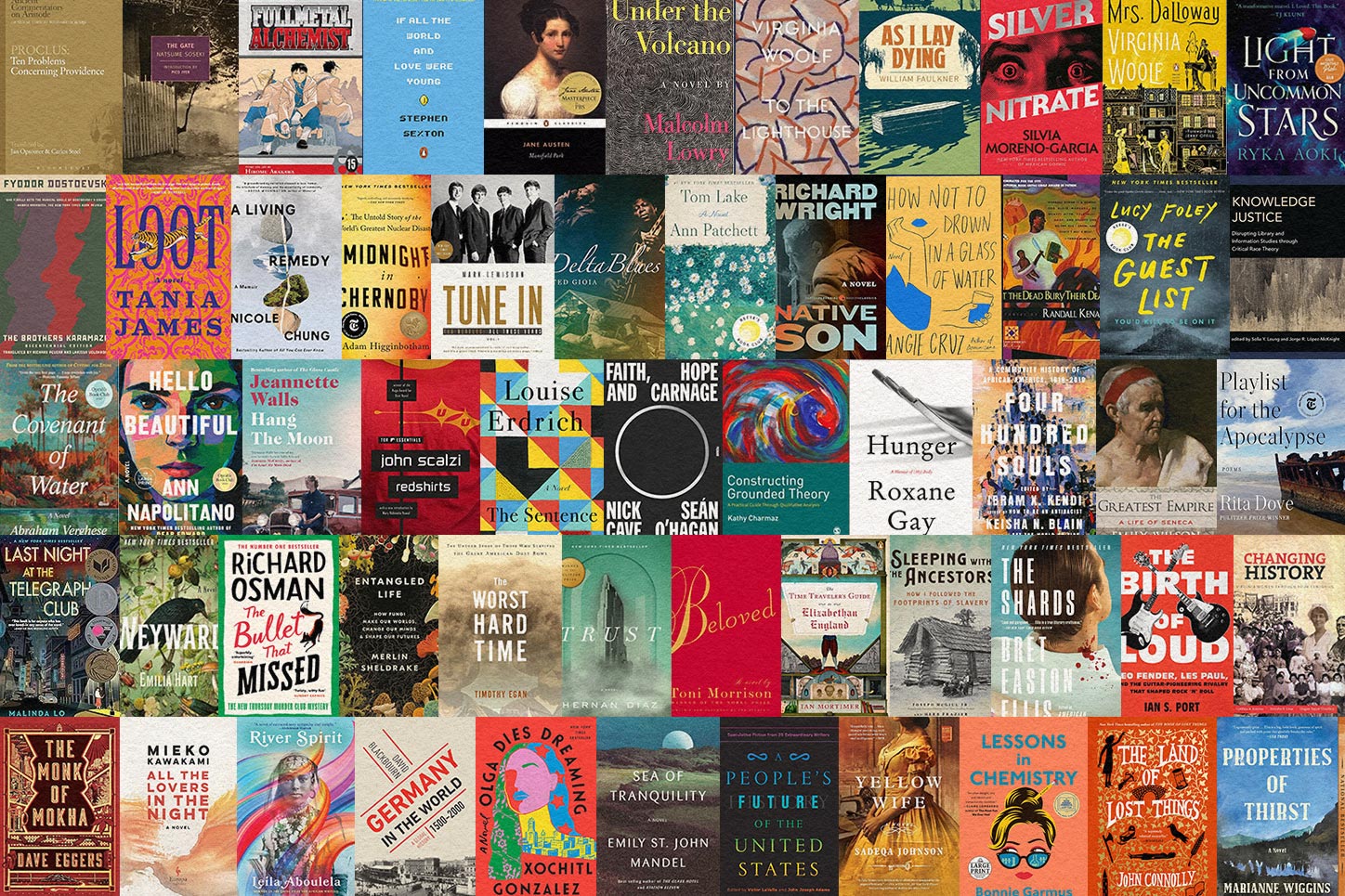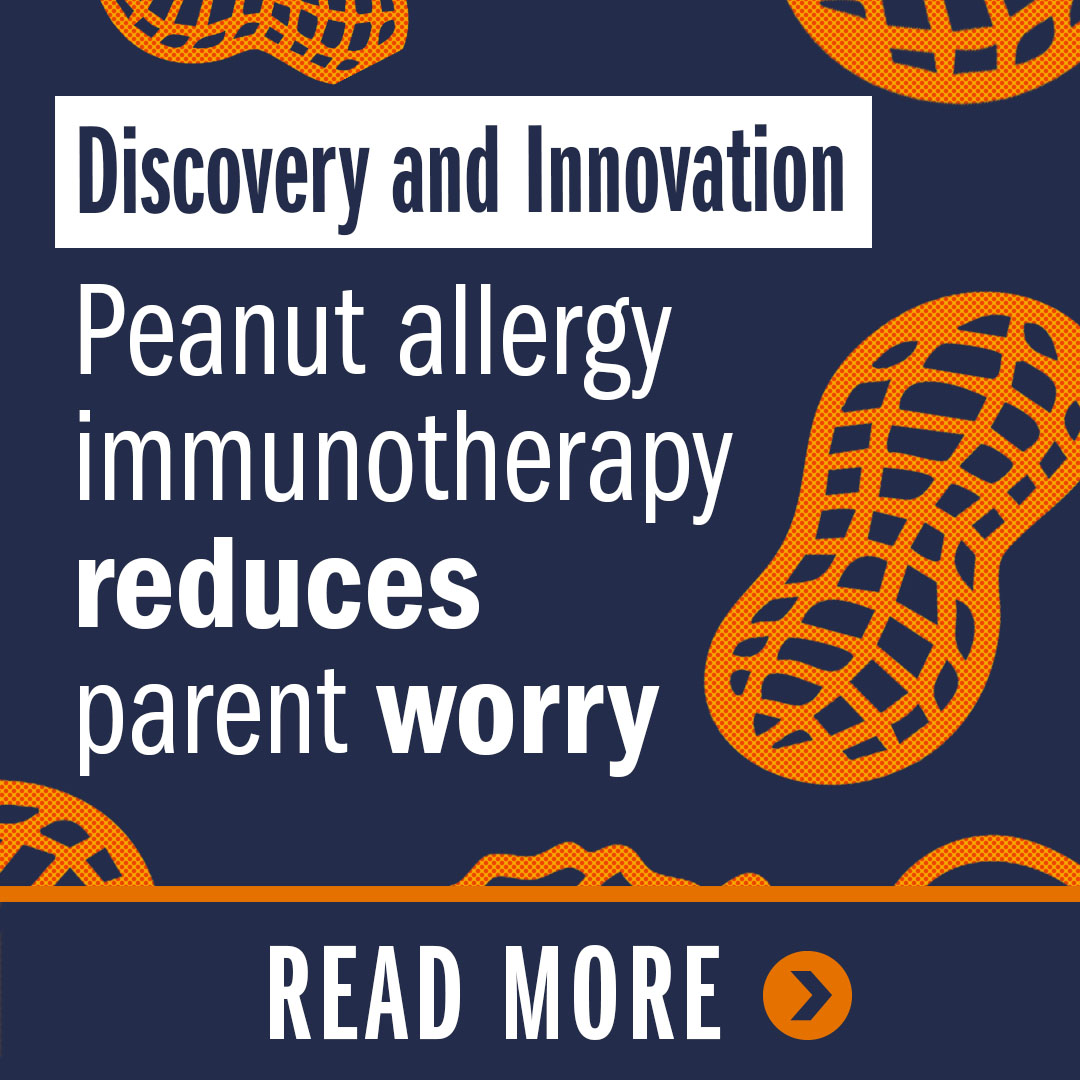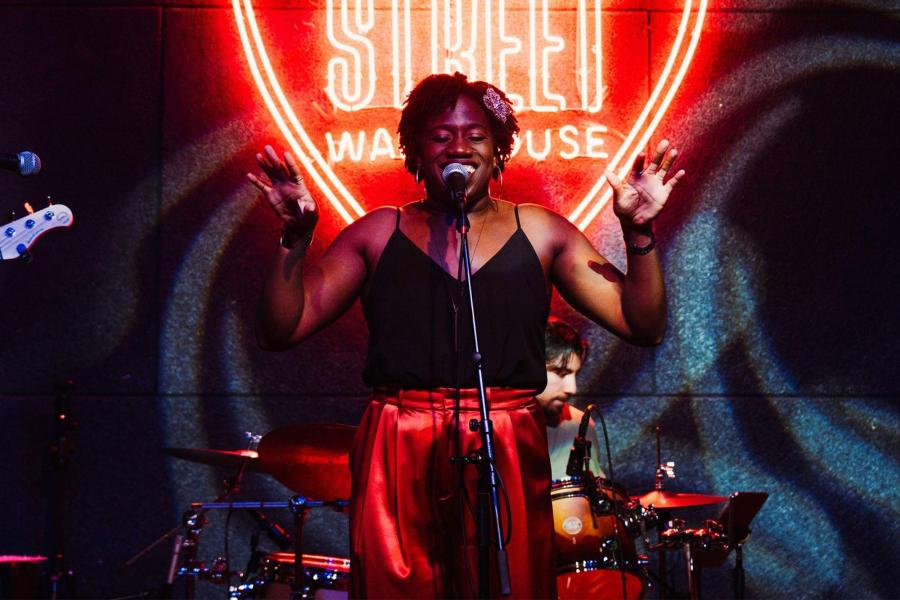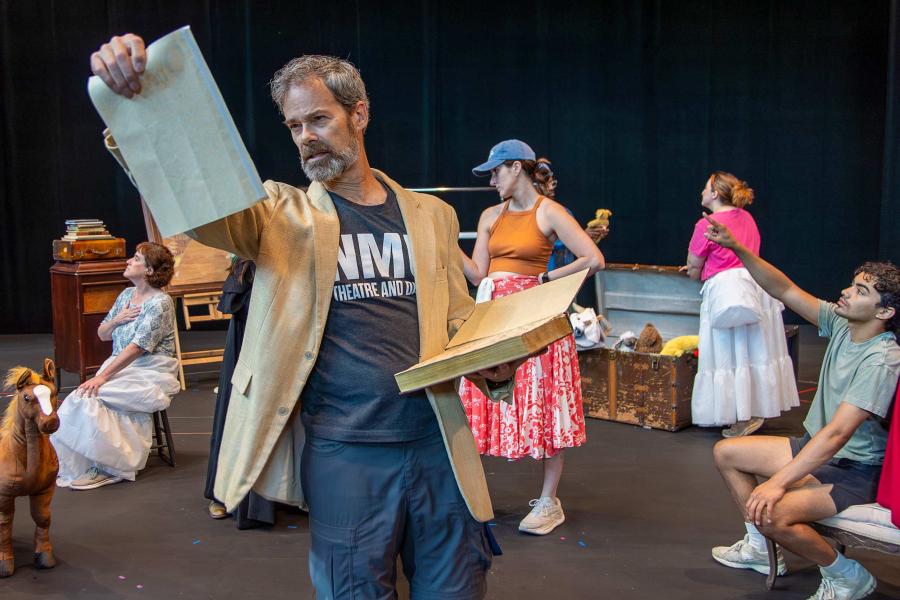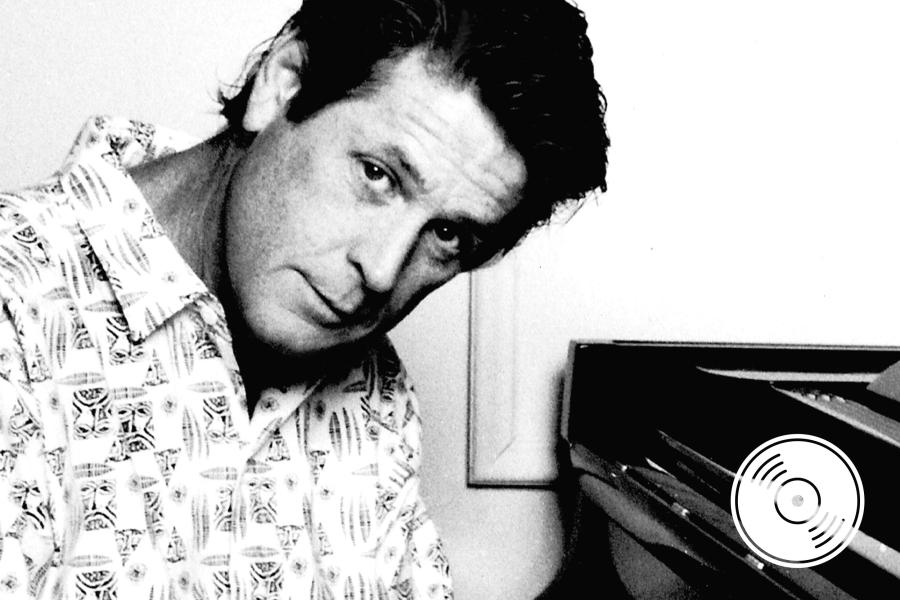As the new year begins, we asked the University of Virginia Library staff to recommend their favorite reads from 2023. The books could be any genre, published in any year, so long as they were available in the collections of the University Library or the Jefferson-Madison Regional Library.
Take a look at each staff member’s top three picks and check out some books. If you are looking for more suggestions, be sure and visit the full list. (Please note: the publication years listed correspond with the editions in the library’s collections, not necessarily the original publication dates.)
Happy reading; see you in the newly renovated main library Jan. 8.
Sherri Brown, Librarian for English
- “How Not to Drown in a Glass of Water,”by Angie Cruz (Flatiron Books, 2022)
This quick read swept me up into the daily trials and tribulations of its narrator, Cara Romero, and left me wanting more. - “Tom Lake,” by Ann Patchett (Harper, 2023)
A mother recounts to her children the summer she fell in love with a soon-to-be movie star. Like all of Patchett’s novels, a delight.
Ann Burns, Metadata Librarian
- “Lessons in Chemistry,” by Bonnie Garmus (Doubleday, 2022)
Hasn’t everyone heard of this one? Elizabeth Zott is confident, prickly and smarter than almost everyone around her, which is what makes her story irresistible. Light, but very profound. - “The Land of Lost Things,” by John Connolly (Emily Bestler Books, Atria, 2023)
This is a sequel but stands by itself. One of the best and most thoughtful fantasy books I’ve read: the power of stories to teach and to heal.
Sue Donovan, Conservator for Special Collections
- “Entangled Life: How Fungi Make Our Worlds, Change Our Minds and Shape Our Futures,” by Merlin Sheldrake (The Bodley Head, 2020)
I thought I loved mushrooms before, but this was transformational. - “The Worst Hard Time: The Untold Story of Those Who Survived the Great American Dust Bowl,” by Timothy Egan (Houghton Mifflin, 2006)
A reread, this time about the Dust Bowl: what led up to it, why it happened when it did, and how things were never the same. Two words that will devastate me forever: dirt mulch.
Haley Gillilan, Undergraduate Student Success Librarian
- “A Living Remedy,” by Nicole Chung (Ecco, 2023)
This memoir about parental loss, navigating the early days of COVID-19 and staying afloat in the American health care system is heartbreaking, but necessary. Chung’s writing always makes me feel less alone and reminds me that grief needs to be expressed. - “Loot,” by Tania James (Knopf, 2023)
This work of historical fiction is such an exciting heist adventure. This book imagines an elaborate backstory for the very real automaton Tipu’s Tiger and how far the inventor will go to get it back.
Grace Hale, Reference Librarian
- “Constructing Grounded Theory: A Practical Guide Through Qualitative Analysis,” by Kathy Charmaz (Sage Publications, 2006)
Although there are plenty of more up-to-date publications available, to my mind this is still the most practical and useful introduction to grounded theory out there for anyone interested in qualitative analysis. I use this manual (along with “Applications of Social Research Methods to Questions in Information and Library Science,” by Barbara M. Wildemuth) whenever thinking about research design. - “Knowledge Justice: Disrupting Library and Information Studies Through Critical Race Theory,” edited by Sofia Y. Leung and Jorge R. López-McKnight (MIT Press, 2021)
This volume brings together a really insightful group of essays on social justice work in libraries by early career [Black, Indigenous, people of color] library and archive professionals.
Bret Heddleston, Print Periodicals Specialist
- “Mon (The Gate),”by Natsume Sōseki; translated by Francis Mathy (Owen, 1972)
Though poorly known in the U.S., Natsume Sōseki is so famous in Japan that they put his picture on the 1,000 yen note. “Mon” is a slow-paced, gently painful and deeply moving story of a struggling young Japanese couple living in alienation from their family and society in Tokyo at the beginning of the 20th century. - “Mansfield Park,” by Jane Austen (Dent, Dutton, 1910)
A short, early work by Jane Austen is titled “The Female Philosopher”; Austen was herself the female philosopher as she wrote her lesser-known major novel, “Mansfield Park.” Readers will enjoy long, philosophical dialogue on norms, society and religion, which occur intermittently between the members of the novel’s main love triangle: the upright (and maybe a little stiff) Edmund Bertram, the cynical and bitingly witty Mary Crawford, and the demure, but well-cultured heroine, Fanny Price.
Laura Hjerpe, Senior Research Data Management Librarian
I read these books for a Meetup group based in Northern Virginia that alternates between nonfiction and fiction.
- “The Monk of Mokha,” by Dave Eggers (Knopf, 2018)
Mokhtar Alkhanshali grows up in San Francisco’s Tenderloin community and eventually becomes a coffee entrepreneur in Yemen. This was such an inspiring story, and I learned about the Yemeni diaspora in the U.S., especially in California. - “All the Lovers in the Night,” by Mieko Kawakami; translated by Sam Bett and David Boyd (Europa Editions 2022)
Fuyuko Irie, a proofreader whose life is her job, struggles with taking initiative, developing interests and connecting with others. I had trouble getting started with this novel, but was completely engrossed by the end.
Ervin “E.J.” Jordan Jr., Research Archivist, Albert and Shirley Small Special Collections Library
- “Santa’s Sleigh Is on Its Way to Virginia: A Christmas Adventure,” by Eric James (Sourcebooks Jabberwocky, 2015)
Illustrated, rhyming tale of Santa’s delivery of gifts and cheer to children in Arlington, Bon Air, Chesapeake, Fairfax, Hampton, Newport News, Norfolk, Oakton, Richmond, Salem and elsewhere. Charmingly suitable for kids from ages 1 to 92. - “Four Hundred Souls: A Community History of African America, 1619-2019,” edited by Ibram X. Kendi and Keisha N. Blain (One World, 2021)
A thought-provoking “choral history” of commentaries, essays, poetry, short stories and personal reflections by 90 writers commemorating 400 years of African American history.
Nancy Kechner, Research Software Specialist
- “Hang the Moon,” by Jeannette Walls (Scribner, 2023)
When Sallie tries to teach young Eddie to be more like their father, her daredevil coaching leads to an accident, and Sallie is cast out. Nine years later, she returns, determined to reclaim her place in the family. - “Hello Beautiful,” by Ann Napolitano (The Dial Press, 2023)
An exquisite homage to Louisa May Alcott’s timeless classic, “Little Women,” “Hello Beautiful” is a profoundly moving portrait of what is possible when we choose to love someone not in spite of who they are, but because of it.
Rose Oliveira-Abbey, Accessioning Archivist
- “Faith, Hope, and Carnage,” by Nick Cave and Sèn O’Hagan (Canongate Books, 2022)
This book is a series of interviews between musician Nick Cave and journalist Sèn O’Hagan in the summer of 2020. The conversation explores grief, the creative practice, addiction and religion. I found his reflections on the death of his son, Arthur, and the effects on him, his family and his art profoundly moving. - “Light from the Uncommon Stars,” by Ryka Aoki (Tor, 2021)
Katrina Nguyen, a transgender run-away violinist, catches the attention of Shizuka Satomi, a former violin star-turned-teacher who has made a deal with the devil. Will Satomi use Katrina to escape her Faustian bargain with the devil? If that isn’t enough, there are aliens, to boot. This book has so many threads that it seems impossible to work. But it does.
Amber Lautigar Reichert, Director of Content Strategy
- “A People’s Future of the United States,” edited by Victor LaValle and John Joseph Adams (One World, 2019)
This collection of speculative fiction gathers inventively hopeful, technologically interesting, and beautifully inclusive tales. Each story left me feeling unexpectedly optimistic about the future of humanity, even as the authors reject any rose-colored depictions of the future (or the present). Plus, after reading from the 25 talented contributors, you’ll have plenty of ideas of what to read next. - “Sea of Tranquility,” by Emily St. Mandel (Knopf, 2022)
A quiet, engrossing sci-fi tale that doesn’t shy away from the fun stuff – the technolust, the temporal paradoxes – but somehow remains fully grounded, both on Earth and the human colony on the moon. My only complaint is that it wasn’t longer: I would’ve happily lived in this world for a long time, but St. Mandel tells a complete, lovely and unforgettable story.
Jennifer Roper, Director of Digital Strategies and Scholarly Communications
- “Trust,” by Hernan Diaz (Riverhead Books, 2022)
The story of a husband and wife living the high life in the Roaring ’20s, primarily in New York. The story is told in three parts, all from different perspectives; all have similarities as well as different portrayals of the primary characters. Ends up with a bit of a “gotcha” moment at the end because everyone is telling the story differently. - “Beloved,” by Toni Morrison (Knopf, 2005)
Post-Civil War tale of a formerly enslaved woman struggling to live with the aftermath of the brutality of enslavement, her hard-fought journey to freedom, and her grief over her choices to protect her children from the life she was forced live.
Douglas Ross, Information Technology Specialist, Institute for Advanced Technology in the Humanities
- “To the Lighthouse,” by Virginia Woolf (Oxford University Press, 2006)
“To the Lighthouse” is Woolf’s most autobiographical novel, and this new edition provides a comprehensive introduction to all aspects of its appeal. - “Mrs. Dalloway,” by Virginia Woolf (Cambridge University Press, 2015)
“Mrs. Dalloway,” created from a series of short stories, is one of Woolf’s best-known novels. Thematically it conveys a rich and genuine humanity, while technically it showcases Woolf’s use of interior perspective.
Josh Thorud, Multimedia Teaching & Learning Librarian
- “Midnight in Chernobyl: The Untold Story of the World’s Greatest Nuclear Disaster,” by Adam Higginbotham (Simon & Schuster, 2019)
This book was eye-opening and deeply researched, clearly articulating how and why things went wrong with both the technology and the bureaucratic system that made it. It makes the people involved feel human rather than cardboard cutouts. - “Delta Blues: The Life and Times of the Mississippi Masters Who Revolutionized American Music,” by Ted Gioia (W.W. Norton, 2008)
As a Delta Blues fan, I loved this book. It dives deep into the roots of Delta Blues and tells the stories of the musicians who innovated, recorded or were inspired by it.
Keith Weimer, Librarian for History and Religious Studies
- “River Spirit,” by Lela Aboulela (Grove Press, 2023)
Sudanese (and two European) characters react to the rise of the Mahdi, “the Expected One,” a figure who claimed to be Islam’s version of the end-times Messiah and drove the British and Turks out of Sudan in the 1880s. Aboulela does a remarkable job of creating and developing multiple voices, and the novel could be used to teach this historical event. - “Germany in the World: A Global History, 1500-2000,” by David Blackbourn (Liveright Publishing Corporation, 2023)
Historians have often regarded Germans as largely reacting to history that was made by Europeans to their west – at least until sometime in the 19th century. This work shows that Germans (there was no united “Germany” until 1871) were significant players in all European intellectual and commercial movements from the “Age of Discovery” onward – movements that were influenced by and impacted people across the globe.
Media Contact
Article Information
July 12, 2025

